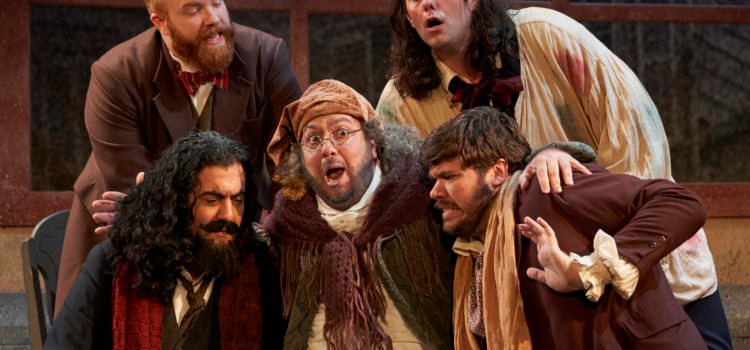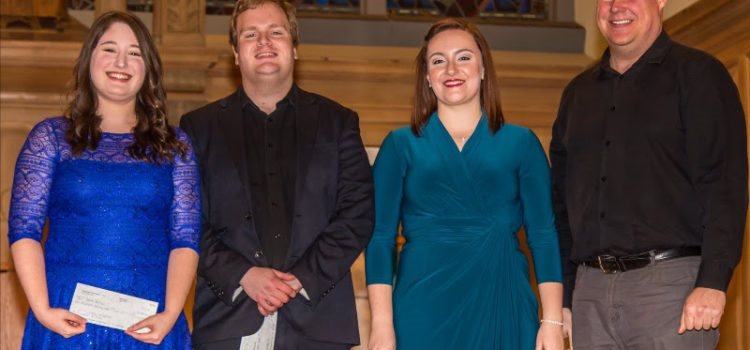By C.B. AdamsContributing Writer
It is tempting to explore the modern cultural significance of Puccini’s La Bohéme. Jonathan Larson’s Rent and Baz Luhrmann’s Moulin Rouge both owe a debt of gratitude to Puccini’s enduring, powerful, story of callow youths in the full throes of love, lust and loss. Echoes of it are recognizable in films like St. Elmo’s Fire and The Breakfast Club, to say nothing of Terms of Endearment, NBC’s Friends or even The Dandy Warhol’s “Bohemian Like You.”
But Puccini’s 1845 bohemian rhapsody is firmly ensconced in the operatic canon, so that discussion would merely detract from Union Avenue Opera’s current production (its third in its 25-year history) of La Bohéme. So, is UAO up to the challenge of this masterwork? If all you seek is a thumbs up or down recommendation, then the answer is a resounding “Yes” and read no further.
But for a few more details, know that UAO’s production
checks all the right boxes for a successful run. Under the stage direction of
Mark Freiman, cast, crew and musicians provide a confident, fresh and energetic
La Bohéme that should delight a first-time operagoer as well as a more seasoned
aficionado. Freiman moves the sometimes large cast, including an ensemble of
raucous children, around the stage with an adroit fluidity that never feels
stagey. Kudos to children’s chorus master, Alice Nelson, for ably herding the
youngsters projecting the exuberance of Muny Kids.
Cree Carrico. Dress rehearsal on July 23, 2019 for Union Avenue Opera’s production of La bohème. Photo by Dan Donovan.Scenic and lighting designer Patrick Huber boldly uses UAO’s
modest stage with a looming diagonal wall that is cleverly transformed from act
to act. This wall serves as a garret window overlooking a projection of the
Paris skyline in Act 1, to the awninged front of Café Momus (hello, Central
Perk) in Act 2, to a shuttered tavern entrance in Act 3, and finally back to
the first set in Act 4. Such scene-changing was impressive to see, but this also
meant an extra intermission to accomplish the changes – a minor quibble.
La Bohéme is not an opera filled with opportunities for
special effects; those pyrotechnics are mostly left to the arias and duets.
Yet, the chill in Act 3 is made ever more palpable with a gentle, realistic
snowfall. After a quick glance upward to “see how it’s done,” it’s easy to
re-suspend one’s disbelief.
Huber’s choice of lighting is interesting. Act 1’s chilly
garret is bathed in a warm, nostalgic, sepia light (Tuscan sunset, anyone?) in
contrast to the bone-chilling ambient temperature endured by the friends
Marcello, Rodolfo, Colline, Schnaunard, Benoit and, later, Mimi. This contrast
avoids the scene from becoming too Dickensian in its harsh poverty. Afterall,
the poet Rodolfo resorts to burning his manuscript to provide a meager warmth.
Just as with films, music supports the moods and actions of
the production and enhances the performance without calling attention to
itself. From the pit, conductor Elizabeth Hastings leads the small orchestra
(including harp by Megan Stout) to reach the fullness of the score with a
deceptively small cadre of musicians. Good things sometimes do indeed come in
small packages.
Regardless of how much stage time the cast’s 10 members had,
each was fully in command of his or her part – in fine voice and expressing a
relaxed chemistry. The entire ensemble, and especially the main cast, are
excellently clad in period costumes that beautifully display costume designer
Teresa Doggett’s keen eye for details and distinguishing characteristics, such
as Mimi’s bonnet and deathbed muff. There are no “wardrobe malfunctions” in
this successful production, only costumes that contribute flawlessly to the
personality of each character, including the exemplary E. Scott Levin as
Benoit, the landlord, who shines in Act I.
Yulia Lysenko as Mimi and Jesse Donner Dress rehearsal on July 23, 2019 for Union Avenue Opera’s production of La bohème. Photo by Dan DonovanThe heartbeat – and heartbreak – of La Bohéme relies on its
central characters, played in this production by the tenor Jesse Donner as
Rodolfo and soprano Yulia Lysenko (making her UAO stage debut) as Mimi.
Matching male and female performance vocals – during duets as well as arias – is
always a challenge, but the talents of Donner and Lysenko intertwine
beautifully. Bradley Cooper and Lady Gaga in A Star Is Born could only dream
of such an effective, equitable pairing.
Puccini’s music with libretto by Luigi Illica and Giuseppe
Giacosa balances the relationship of Mimi and Rodolfo with their friends and
fellow starving artists. Andrew Wannigman as Marcello is delightful as the
painter whose eyes are just as expressive as his voice. As the singer Musetta,
Cree Carrico (making her UAO debut) plays Marcello’s love interest with a
broadly appealing, tarty flirtatiousness.
Before Mimi enters Act 1, the bro-ish camaraderie is captured with earnest high energy as Isaiah Musik-Ayala (making his UAO debut) as Colline, a philosopher, and Nicholas Ward as Schaunard, a musician, join Donner and Wannigman in the spartan garret. This production’s “deep bench” of talent extends even to the relatively small part of Parpignol, a toy vendor. As played by Dale Obermark (making his UAO debut) Parpignol is memorable, charming and a highlight of Act 2.
Good opera like all great art is worthy of repeated attention. La Bohéme may be an operatic chestnut, but UAO’s interpretation of this classic lives up to the strong material and will surely withstand the test of time as one of this company’s most noteworthy productions.
Union Avenue Opera presents “La Boheme” July 26, 27 and Aug. 2, 3 at 8 p.m. at Union Avenue Christian Church. For more information, visit www.unionavenueopera.org.

Lynn (Zipfel) Venhaus has had a continuous byline in St. Louis metro region publications since 1978. She writes features and news for Belleville News-Democrat and contributes to St. Louis magazine and other publications.
She is a Rotten Tomatoes-approved film critic, currently reviews films for Webster-Kirkwood Times and KTRS Radio, covers entertainment for PopLifeSTL.com and co-hosts podcast PopLifeSTL.com…Presents.
She is a member of Critics Choice Association, where she serves on the women’s and marketing committees; Alliance of Women Film Journalists; and on the board of the St. Louis Film Critics Association. She is a founding and board member of the St. Louis Theater Circle.
She is retired from teaching journalism/media as an adjunct college instructor.


